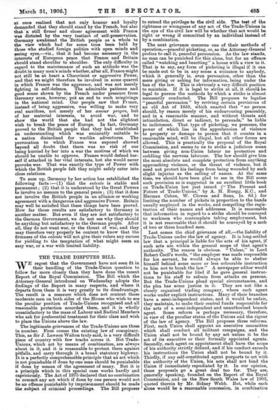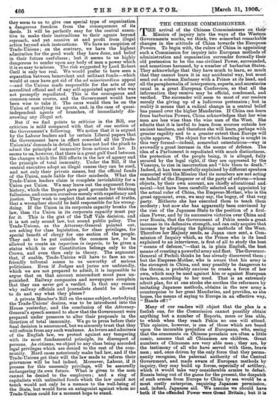THE TRADE DISPUTES BILL.
WE regret that the Government have not seen fit in their handling of the Trade-Union question to follow far more closely than they have done the recent Report of the Royal Commission. The Bill which the Attorney-General introduced on Wednesday adopts the findings of the Report in many respects, and where it departs from them it is very greatly to its disadvantage. The result is a measure which does not content those moderate men on both sides of the House who wish to see the peculiar position of Trade-Unions recognised and all reasonable protection accorded them, and it is wholly unsatisfactory to the mass of Labour and Radical Members who ask for preferential treatment for their class and wish to place the Unions above the law.
The legitimate grievances of the Trade-Unions are three in number. First comes the existing law of conspiracy. This, as Sir J. Lawson Walton truly said, is a very difficult piece of country with few tracks across it. But Trade- Unions, which act by means of combination, are always about in it, and it is reasonable to protect them against pitfalls, and carry through it a broad statutory highway. It is a perfectly comprehensible principle that an act which is not punishable if done by one man should be punishable if done by means of the agreement of many. But it is a principle which in this special case works hardly and capriciously. The Act of 1875 'declared that no combination to commit any act which if done by one person would not be an offence punishable by imprisonment should be made the subject of criminal proceedings. The Bill proposes to extend the privilege to the civil side. The test of the rightness or wrongness of any act of the Trade-Unions in the eye of the civil law will be whether that act would be right or wrong if committed by an individual instead of by a combination.
The next grievance concerns one of their methods of operation,—peaceful picketing, or, as the Attorney-General prefers to call it, peaceful persuasion. As the law stands, no man can be punished for this alone, but for an offence called "watching and besetting" a house with a view to it. That is to say, any form of picketing is illegal if it can be made out to be in any sense a nuisance to anybody, which it generally is, even persuasion, other than the mere giving or asking for information, being under the ban of the law. This is obviously a very difficult position to maintain. If it is legal to strike at all, it should be legal to pursue the methods by which a strike is almost necessarily conducted. The Bill proposes to legalise "peaceful persuasion" by reviving certain provisions of an old Act of 1859, which enacted that "no person should, by reason merely of his endeavouring peaceably, and in a reasonable manner, and without threats and intimidation, direct or indirect, to persuade," be liable to indictment. That type of picketing, we presume, the power of which lies in the apprehension of violence to property or damage to person that it creates in a reasonable mind, will r'be illegal, but all other forms are allowed. This is practically the proposal of the Royal Commission, and seems to us to strike a judicious mean between giving non-Union labour no protection and coddling the nervous labourer. The law should give him the most absolute and complete protection from anything approaching violence, or the threat of violence, but it need not protect his feelings from being wounded by such slight injuries as the calling of names. At the same time, we should have been glad to see in the Bill some such provision as is suggested in an excellent little book on Trade-Union law just issued (" The Present and Future of Trade-Unions," by A. H. Ruegg, K.C., and Herman Cohen, W. Clowes and Sons, is. 6d.) for limiting the number of pickets in proportion to the hands usually employed in the works, and compelling the regis- tration of their names and addresses. It is reasonable that information in regard to a strike should be conveyed to workmen who contemplate taking ereployment, but it is not reasonable that it should be conveyed by a mob of two or three hundred men.
Last comes the chief grievance of all,—the liability of Trade-Unions under the law of agency. It is long-settled law that a principal is liable for the acts of his agent, if such acts are within the general scope of that agent's authority. The reason is obvious. "Unless," in Lord Robert Cecil's words, "the employer was made responsible for his servant, he would always be able to shelter himself behind some more or less colourable instruction to him not to break the law." A newspaper editor would not be punishable for libel if he gave general instruc- tions to his staff to refrain from attacks on persons. But the Trade-Unions plead special circumstances, and the plea has some justice in it. They are not like a closely organised trading company, where each agent works under explicit instructions. Many of their branches have a semi-independent status, and it would be unfair, they maintain, to make their central funds responsible for the acts of a semi-independent and unauthorised branch agent. Some reform is perhaps necessary, therefore, in view of the peculiar status of the Unions and the rigour of the law of agency. The Bill proposes three reforms. First, each Union shall appoint an executive committee which shall conduct all militant campaigns, and the Union shall not be bound by any act unless it be the act of its executive or their formally appointed agents. Secondly, each agent on appointment shall have the scope of his authority strictly defined, and if his conduct exceeds his instructions the Union shall not be bound by it. Thirdly, if any self-constituted agent purports to act with the authority of the Union, his acts shall not bind the Union if immediately repudiated by it. In our opinion, these proposals go a great deal too far. They are, generally speaking, founded on the Report of the Royal Commission, and on the New South Wales law of 1903, quoted therein by Mr. Sidney Webb. But, while each alone would be a reasonable concession, in combination they seem to us to give one special type of organisation a dangerous freedom from the consequences of its deeds. It will be perfectly easy for the central execu- tive to make their instructions to their agents beyond reproach, and yet connive at and profit from illegal action beyond such instructions. We have no suspicion of Trade-Unions ; on the contrary, we have the highest admiration for the good work they have done, and belief in their future usefulness ; but it seems to us highly dangerous to confer upon any body of men a power which it is so easy to misuse. The risk suggested by Lord Robert Cecil is only too real. We would prefer to have seen a separation between benevolent and militant funds—which would at once have got rid of the ad misericordiant appeal —and the Unions made responsible for the acts of any accredited official and of any self-appointed agent who was not promptly repudiated. This is the courageous and common-sense course, and the Government would have been wise to take it. The onus would then be on the Union of specifying its agents, and, in the case of quasi- independent agents of branches, of immediately dis- avowing any illegal act.
But if we find points to criticise in the Bill, our criticism is mild compared with that of one section of the Government's following. We notice that it is argued by the Labour leaders and by certain Liberal papers that the Government have in effect conceded all the Trade- Unionists' demands in detail, but have not had the pluck to admit the principle of immunity from actions at law. It seems to us, however, that there is a great gulf fixed between the changes which the Bill effects in the law of agency and the principle of total immunity. -Under the Bill, if the central executive adopt an illegal course they can be sued, and not only their private means, but the official funds of the Union, made liable for their misdeeds. What the Trade-Union leaders claim is complete inviolability for a Union qua, Union. We may leave out the argument from history, which the Report gave good grounds for thinking fallacious, and concern ourselves merely with expediency and justice. They wish to neglect that most ancient of truths, that a wrongdoer should be held responsible for his wrong- doing. If the Union in its corporate capacity breaks the law, then the Union in its corporate capacity must pay for it. This is the gist of the Taff Vale decision, and it is not only sound law, but sound public policy. The Trade-Unions, as the Attorney-General pointed out, are asking for class legislation, for class privileges, for special benefit of clergy for one section of the people. They ask to be put outside the common law, to be allowed to create an imperium in imperio, to be given a status which in our Constitution belongs only to the Crown, and even then only in theory. The argument that, if suable, Trade-Unions will have to face an un- friendly tribunal seems to us unworthy of serious politicians. Even if Judges and juries are unfriendly, which we are not prepared to admit, it is impossible to argue that on that account misconduct must pass un- punished. Railway companies and newspapers complain that they can never get a verdict. Is that any reason why railway officials and journalists should be allowed to do and say what they please?
A private Member's Bill on the same subject, embodying the Trade-Unions' desires, was to be introduced into the House yesterday, and the conclusion of the Attorney- General's speech seemed to show that the Government were prepared under pressure to alter their proposals in the direction of total immunity. We go to press before their final decision is announced, but we sincerely trust that they will refrain from any such weakness. As lovers and admirers of the English law, we protest against any tampering with its most fundamental principle, its disrespect of persons. As citizens, we object to any class being accorded legal privileges which are denied to the rest of the com- munity. Hard cases notoriously make bad law, and if the Trade-Unions get their will the law made to reform their grievances will be bad indeed. Moreover, Labour, if it presses for this unseemly privilege, will be assuredly endangering its own future. What is given to the men cannot be denied to the employers ; and a ring of capitalists with unlimited funds which the law could not touch would not only be a menace to the well-being of the State, but would form an antagonist against whom no Trade-Union could for a moment hope to stand.











































 Previous page
Previous page